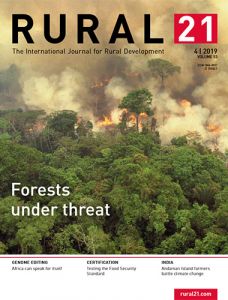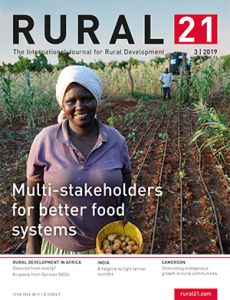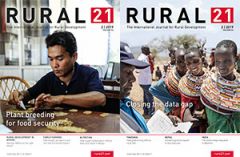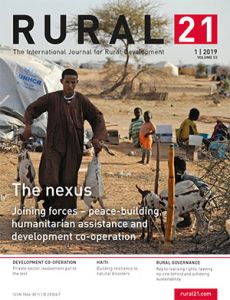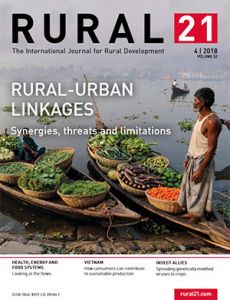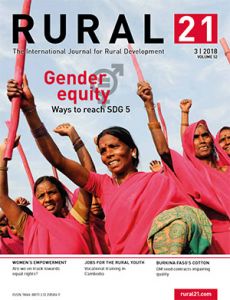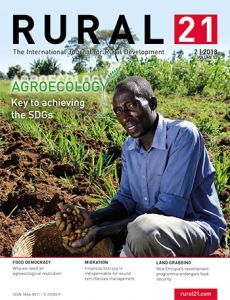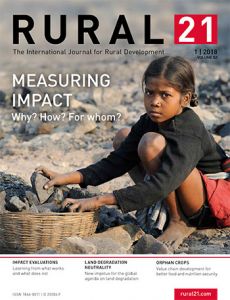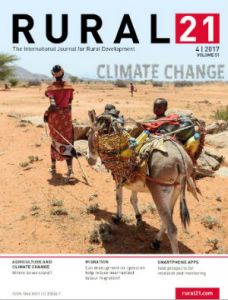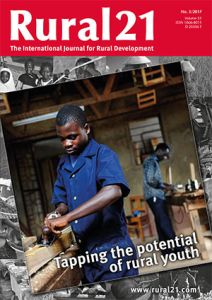Rural 21 (Englische Ausgabe)
-
Rural 21 (engl. Ausgabe 4/2019)
Focus 4/2019: Forests under threat
The world’s forests are under threat. Forest fires and deforestation are reaching frightening proportions. Even though considerable progress has been made in reforestation, this cannot obscure the simple fact that, at least in terms of tropical forests and primary forests, the net balance is negative – despite everyone being aware of the immense significance that forested landscapes in maintaining ecosystem equilibrium and for people’ livelihoods and well-being. Of course, besides seeking to draw attention to these worrying developments, our articles are above all meant to point to solutions. How can previously intact forest stocks be restored? What are the conditions that need to be created in order to avoid further deforestation and forest degradation? And above all, how can people in rural areas benefit from the environmental services of trees without a conflict arising between using and protecting the forest?
Erfahren Sie mehr -
Rural 21 (engl. Ausgabe 3/2019)
Focus 3/2019: Multi-stakeholders for better food systems
The more globalisation moves forward, the more complex the interplay between different stakeholders becomes. Sustainable Development Goal 17 is dedicated to partnerships for the goals to harmonise and plan interaction among multi-stakeholders together. But what does this mean for the agricultural and food sector in rural areas in particular? A food system comprises not only traditional value chains, but also consumption and the environment. This calls for concerted action among governments, the private sector and civil society to achieve a sustainable and healthy food system, including its value chains, while considering the different conflicts of interest among the parties involved. In order to understand each other, a common language should be created. This can be achieved through standards and certifications, but also through clearly formulated agreements such as in contract farming. Over the last decades, products produced under labour and social standards or certified by sustainability standards such as Fairtrade or organic standards have come into play and are more popular with the consumer side. But who benefits from this? Is it the small-scale farmers, who have to adapt their production, increase their income and yields, reduce health and environmental risks caused by inappropriate farming practices and enhance nutrition diversity on their own plate while creating traceability and transparency at the same time?
This edition gives special emphasis to this complexity of actors and their interests to work together, sometimes even at inter-sector level. There is no one-size-fits-all approach, for local circumstances play an important role. We have chosen examples of typical interactions in food systems either to show who is involved in a particular case and what the outcome is – the added value of the common action – or to point out advantages and disadvantages of all actors involved and their incentive to participate in a specific step in the value chain.
Erfahren Sie mehr -
Rural 21 (engl. Ausgabe 2/2019)Focus 2/2019: Plant breeding / Impact measurement
For this section of the current edition, we asked specialists from international agricultural research centres to give accounts of their activities in plant breeding. This had been prompted by the ruling of the European Court of Justice in late July 2018 stipulating that new plant breeding technologies such as genome editing receive the same legal treatment as conventional genetic engineering methods do. While this does not ban their application (in Europe), they are now subject to stringent regulatory conditions. In response to this development, leading scientists from more than 85 European plant and life science research centres issued a position paper warning that the ruling was “irresponsible in the face of the world’s current far-reaching agricultural challenges”. This edition of Rural 21 is by no means intended to once again spark the old debate on the pros and cons of genetic engineering – the arguments here are by and large well familiar, and positions regarding the issue are more or less firmly established. Rather, what we want to show is which developments plant breeding has seen over the last few decades and what challenges it faces today given climate change and more and more global crises. In face of eleven years left to achieve Agenda 2030 and monitor the Sustainable Development Goals (SDGs) on the way there, data access, management and protection is becoming more important than ever. Moreover, identifying measures to combat climate change for resilience and food security requires the availability of accurate and up-to-date data. But data have to be collected, analysed, disseminated and maintained, and in many cases, the capacities needed for this are lacking. This section of the latest Rural 21 edition is dedicated to showcasing how to close this data gap. Erfahren Sie mehr -
Rural 21 (engl. Ausgabe 1/2019)Focus 1/2019: The nexus
Recurring crises and protracted conflicts world-wide have become the new normal and are leading to fragility, insecu¬rity and migration. Since refugees flee from their insecure region to a less fragile one, the demands in the new region are twofold – the refugees need basic services such as shelter, medical service, food and sanitation, while the host coun¬tries and communities request support for a sustainable use of natural resources in what is now a region of increased popu¬lation density. On-going crises and conflicts not only demand humanitarian assistance but also call for development co-op¬eration and peace-building. If a crisis is protracted, as is the case in Bangladesh with the Rohingya refugees in Cox’s Bazar camp, then it becomes important to provide solutions bridging the gap between humanitarian assistance and development co-operation, while supporting peace-building. This interac¬tion is called the Humanitarian-Development-Peace Nexus, or simply the triple nexus. But how do the different international institutions and organ¬isations benefit from synergies when working together? Who develops and oversees the diverse approaches of the various actors to complementing each other’s work? To align these actions at global level, the first United Nations World Humanitarian Summit was held in Istanbul, Turkey, in 2016. Since then, different methods have been set up or gained more significance, such as the UN’s New Way of Working, the Whole-of-Govern¬ment approach and Linking Relief, Rehabilitation and Development (LRRD). Global actors coming from the European Commission, the German Government, the International Com¬mittee of the Red Cross, as well as the World Food Programme present their views and approaches in this edition. Case studies and examples come from crises and conflictive regions such as Syria and neighbouring coun¬tries, the Rohingya refugee camp in Bangladesh, as well as the Lake Chad conflict in the Sahel. But what about natural disasters such as the earthquake in Haiti? How did the country return to agriculture with life disrupted on a destroyed island? Further case studies on adapting to climate change and to more resilience to recurrent (food) crises such as in Mali complement this edition’s selection of articles. Erfahren Sie mehr -
Rural 21 (engl. Ausgabe 4/2018)Focus 4/2018: Rural-urban linkages
By 2050, two thirds of the world’s population are expected to live in cities. The United Nations New Urban Agenda implies changing diets and thus the need to include sustainable food systems for the cities. So the rural areas have to transform in parallel. Secondary cities are growing enormously in the rural areas and play a crucial role in coping with waste management or wastewater treatment and other problems that are arising. Spatial regional planning approaches have to be adjusted to take rural and urban development into account in parallel. Do rural surroundings really feed urban areas? And what about other flows such as cash in form of remittances, or the dynamics of geographical closeness which can lead to health risks? Land and resource conflicts may arise when cities are growing, and the demand for goods and services is changing production in the rural areas. Do such linkages pose an advantage or a threat? This edition provides advices and examples of best practices as well as failures to bridge the gap between rural and urban regions. Erfahren Sie mehr -
Rural 21 (engl. Ausgabe 3/2018)Focus 3/2018: Gender equity
No doubt a lot has happened in terms of gender equity and equality over the last few decades. There are women who head states and hold high positions in international organisations. There are women who successfully lead enterprises and have long ceased limiting their role to that of a caregiver. But progress is extremely slow. And some of it has been reversed, as the 2017 Global Gender Gap Report of the World Economic Forum notes. In 27 out of the 144 countries examined, progress towards gender parity is once again regressing. And since the #MeToo movement at the latest, it has become frighteningly clear just how commonplace it continues to be to mercilessly take advantage of the power structure between men and women – in order to inhibit, humiliate, sexually molest, hit and kill them. Whether we are in the Global North or the Global South makes little difference in this context. Gender equality and women`s empowerment represents a topic that is far too complex to be dealt with comprehensively in one single edition. We can only deal briefly with many of the areas that it no doubt encompasses, including both those mentioned above and education, the digital gender divide, reproductive health und female genital mutilation. We nevertheless hope that our selection of themes will make you more aware of this topic. Erfahren Sie mehr -
Rural 21 (engl. Ausgabe 2/2018)Focus 2/2018: Agroecology
In 2008, the authors of the International Assessment of Agricultural Knowledge, Science and Technology for Development (IAASTD) report arrived at the conclusion that “business as usual is not an option” to make global food security sustainable. The radical transformation of the existing food and agricultural system that the report calls for was initially given a lukewarm reception by many international organisations. But the adoption of the Sustainable Development Goals provided the demands raised in the IAASTD report with new impetus. This edition illustrates the concept and the different definitions of agroecology. In addition, we asked representatives from various institutions – UN Organisations and research institutions, German and Swiss development co-operation, the German Agricultural Society and non-governmental organisations from the Global South – to inform us about which aspects of the agroecological approach they attach particular importance to and how this affects their own activities. Erfahren Sie mehr -
Rural 21 (engl. Ausgabe 1/2018)Focus 1/2018: Measuring impact
On average, 400,000 US dollars and a period of three years is needed to measure the effect of a development intervention, the International Initiative for Impact Evaluation concludes from its activities. These are valuable resources that need to be used carefully. Our authors describe which impact measurement methods have proved to be useful during the last few years and what their strengths and their limits are. And they demonstrate when impact evaluations make sense – and when they don’t. Erfahren Sie mehr -
Rural 21 (engl. Ausgabe 4/2017)Focus 4/2017: Climate Change
Agriculture is a major contributing factor to climate change; at the same time, it is one of the areas most affected by climate change, which is jeopardising global food security. But is the significance of agriculture also reflected in international climate negotiations? And, after the recent world climate summit, what’s next? Our authors have a look at what progress has been made in the debate, and, taking different examples, they demonstrate how resilience towards climate change can be enhanced not only for agriculture, but also for communities as a whole. Erfahren Sie mehr -
Rural 21 (engl. Ausgabe 3/2017)Focus 3/2017: Youth
Given that today, two out of five economically active youth around the world are unemployed, or work, but live in poverty, and that alone in sub-Saharan Africa, the youth population is set to double, reaching more than 350 million by 2050, creating income and employment opportunities for these young people is certainly one of the areas in most urgent need of action. We demonstrate initiatives addressing these issues from a wide range of countries throughout the world, and let representatives of development co-operation, politics, the private sector and, last but not least, rural youth give their views. Erfahren Sie mehr

